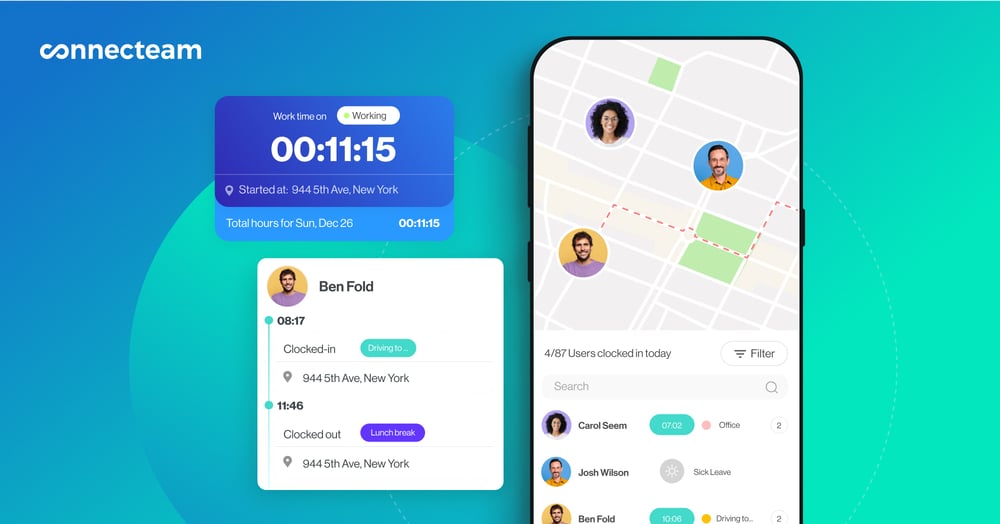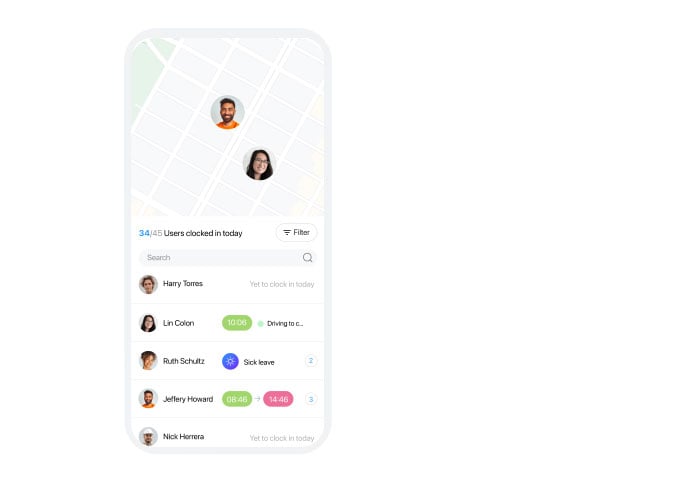Want to use GPS tracking in your business? This guide covers what’s legal, what’s not, and breaks down GPS tracking laws by state so you can stay compliant.
Thinking about tracking your employees’ locations? Read the fine print first.
GPS tracking can boost efficiency, prevent time theft, and improve safety, especially for teams in the field. But it also comes with legal risks you should know.
This article breaks down GPS tracking laws by state and shows you how to stay compliant while using location tracking tools.
Key Takeaways
- U.S. federal law doesn’t ban GPS tracking by private employers.
- Many states restrict GPS use to prevent stalking, with only a few addressing workplace tracking directly.
- Businesses should create a clear GPS tracking policy and may employee consent before using tracking tools.
- To protect privacy, use GPS tracking solutions like Connecteam that only track locations during work hours. tracks employees’ locations only during work hours.
Is GPS Tracking Legal for Employers in the U.S.?
Yes, but it depends on how and where it’s used. There’s no federal law in the U.S. that directly regulates GPS tracking. Instead, each state can set its own rules. Many of these laws appear in anti-stalking statutes, which aim to prevent criminal behavior, rather than addressing workplace practices.
Only a few state laws specifically mention businesses, but some allow GPS tracking for valid employer use, especially when it involves company-owned vehicles.
In most cases, state laws are more likely to regulate GPS use in vehicles than in phones or other devices.
Legal cases in Missouri and Texas have upheld this approach, ruling that employees had no right to privacy when tracked in business-owned vehicles, even without their consent.
The Purpose Behind GPS Tracking Laws
Most GPS tracking laws exist to protect individuals from privacy violations that could put them in harm’s way, like stalking, harassment, or unauthorized surveillance. Very few states specifically regulate GPS tracking by employers or legitimate businesses.

GPS Tracking Laws by State
In general, GPS tracking is allowed with the consent of the person being tracked or the owner of the vehicle. For details on how your state handles it, check out our state-by-state breakdown.
For a quick overview, find your state on the map below!
US GPS Tracking Laws by State
Click on a state for detailed information.
Alabama
GPS Tracking for Employers: Not prohibited.
Relevant Restrictions: Surveillance while trespassing in a private place is a criminal offense.
Employer-Specific Notes: No direct restriction on employer use.
Read our full guide on Alabama state labor laws.
Alaska
GPS Tracking for Employers: Not prohibited.
Relevant Restrictions: Anti-stalking laws prohibit GPS tracking without consent if it causes fear.
Employer-Specific Notes: No direct restriction on employer use.
Read our full guide on Alaska state labor laws.
Arizona
GPS Tracking for Employers: Not prohibited.
Relevant Restrictions: Anti-stalking law prohibits GPS use without consent for 12+ hours or on multiple occasions.
Employer-Specific Notes: No direct restriction on employer use.
Read our full guide on Arizona state labor laws.
Arkansas
GPS Tracking for Employers: Not prohibited.
Employer-Specific Notes: No direct restriction on employer use.
California
GPS Tracking for Employers: Restricted.
Relevant Restrictions: Criminal offense to track someone’s location without consent.
Employer-Specific Notes: Consent required, even for company-owned vehicles.
Read our full guide on California state labor laws.
Colorado
GPS Tracking for Employers: Not prohibited.
Relevant Restrictions: Vonnie’s Law prohibits using GPS tracking to cause serious emotional distress.
Employer-Specific Notes: No direct restriction on employer use.
Read our full guide on Colorado state labor laws.
Connecticut
GPS Tracking for Employers: Allowed with notice.
Relevant Restrictions: Written notice required before monitoring employees electronically.
Employer-Specific Notes: Consent not required under the Electronic Monitoring Act.
Delaware
GPS Tracking for Employers: Not prohibited.
Relevant Restrictions: It is illegal to install a GPS device on a vehicle without the owner’s consent.
Employer-Specific Notes: No specific restrictions on employer use when the business owns the vehicle.
Florida
GPS Tracking for Employers: Allowed.
Relevant Restrictions: Illegal to install a tracking device on another person’s property without consent, but exceptions exist for legitimate business purposes.
Employer-Specific Notes: Employers may track company-owned vehicles and devices; tracking personal property requires consent.
Read our full guide on Florida state labor laws.
Georgia
GPS Tracking for Employers: Not prohibited.
Employer-Specific Notes: No direct restriction on employer use.
Read our full guide on Georgia state labor laws.
Hawaii
GPS Tracking for Employers: Not prohibited.
Relevant Restrictions: Illegal to intentionally install GPS devices on someone’s property without consent or a warrant.
Employer-Specific Notes: No direct restriction on employer use.
Idaho
GPS Tracking for Employers: Not prohibited.
Relevant Restrictions: No specific GPS laws; tracking is only restricted when used to intercept communications.There are no state laws in Idaho that prohibit GPS tracking of employees.
Employer-Specific Notes: No direct restriction on employer use.
Illinois
Illinois doesn’t prohibit GPS tracking of employees for business purposes.
GPS Tracking for Employers: Allowed.
Relevant Restrictions: Anti-stalking laws prohibit GPS tracking of vehicles without the owner’s consent.
Employer-Specific Notes: Employers may track company-owned vehicles while in use by employees.
Read our full guide on Illinois state labor laws.
Indiana
GPS Tracking for Employers: Not prohibited.
Relevant Restrictions: No active law, but a bill has been introduced to restrict tracking a person or property without consent.
Employer-Specific Notes: Tracking currently allowed unless law changes.
Read our full guide on Indiana state labor laws.
Iowa
GPS Tracking for Employers: Not prohibited.
Relevant Restrictions: Illegal to place a GPS device to track movement without a legitimate purpose.
Employer-Specific Notes: Business use qualifies as a legitimate purpose.
Kansas
GPS Tracking for Employers: Not prohibited.
Relevant Restrictions: Updated anti-stalking law includes GPS tracking as a possible form of harassment.
Employer-Specific Notes: No direct restriction on employer use.
Kentucky
GPS Tracking for Employers: Not prohibited.
Relevant Restrictions: It is illegal to use a GPS device on a vehicle without the owner’s consent.
Employer-Specific Notes: No direct restriction on employer use.
Read our full guide on Kentucky state labor laws.
Louisiana
GPS Tracking for Employers: Allowed with consent.
Relevant Restrictions: It is illegal to use GPS to determine a person’s location without their consent.
Employer-Specific Notes: Exception exists for employers providing GPS-enabled devices for job-related use.
Maine
GPS Tracking for Employers: Not prohibited.
Relevant Restrictions: Anti-stalking laws prohibit GPS tracking that causes emotional distress or fear of harm.
Employer-Specific Notes: No direct restriction on employer use.
Maryland
GPS Tracking for Employers: Not prohibited.
Relevant Restrictions: GPS tracking without knowledge or consent is banned if it causes fear of injury or serious emotional distress.
Employer-Specific Notes: No direct restriction on employer use.
Massachusetts
GPS Tracking for Employers: Not prohibited.
Relevant Restrictions: Illegal to use electronic communication, including GPS, to cause substantial emotional distress.
Employer-Specific Notes: No direct restriction on employer use.
Read our full guide on Massachusetts state labor laws.
Michigan
GPS Tracking for Employers: Allowed in specific cases.
Relevant Restrictions: Illegal to place a GPS device on a vehicle without the owner’s consent.
Employer-Specific Notes: No direct restriction on employer use.
Read our full guide on Michigan state labor laws.
Minnesota
GPS Tracking for Employers: Restricted.
Relevant Restrictions: Illegal to install a tracking device on a vehicle without the driver’s consent or a court order.
Employer-Specific Notes: Employers may track company vehicles if it assists the driver; other tracking may require consent.
Read our full guide on Minnesota state labor laws.
Mississippi
GPS Tracking for Employers: Not prohibited.
Employer-Specific Notes: No direct restriction on employer use.
Missouri
GPS Tracking for Employers: Not prohibited.
Employer-Specific Notes: No direct restriction on employer use.
Read our full guide on Missouri state labor laws.
Montana
GPS Tracking for Employers: Not prohibited.
Relevant Restrictions: Law enforcement must obtain a warrant to access GPS data.
Employer-Specific Notes: No direct restriction on employer use.
Nebraska
GPS Tracking for Employers: Not prohibited.
Employer-Specific Notes: No direct restriction on employer use.
Nevada
GPS Tracking for Employers: Not prohibited.
Employer-Specific Notes: No direct restriction on employer use.
Read our full guide on Nevada state labor laws.
New Hampshire
GPS Tracking for Employers: Possibly restricted.
Relevant Restrictions: Individuals may not place GPS devices on a person or property without consent.
Employer-Specific Notes: Law is unclear on whether employer tracking requires employee consent.
New Jersey
GPS Tracking for Employers: Not prohibited.
Employer-Specific Notes: No direct restriction on employer use.
New Mexico
GPS Tracking for Employers: Not prohibited.
Relevant Restrictions: Anti-stalking law prohibits surveillance that causes fear of harm or confinement.
Employer-Specific Notes: No direct restriction on employer use.
New York
GPS Tracking for Employers: Allowed with limitations.
Relevant Restrictions: Illegal to use GPS tracking without consent if it causes reasonable fear of harm.
Employer-Specific Notes: Employers may track employees during work hours; best practice is to notify and obtain consent.
Read our full guide on New York state labor laws.
North Carolina
GPS Tracking for Employers: Allowed with exceptions.
Relevant Restrictions: Cyberstalking law prohibits GPS tracking without consent, but allows it for fleet owners and with vehicle owner permission.
Employer-Specific Notes: Employers may track company vehicles.
Read our full guide on North Carolina state labor laws.
North Dakota
GPS Tracking for Employers: Not prohibited.
Relevant Restrictions: Tracking that causes fear or intimidation and serves no legitimate purpose is considered stalking.
Employer-Specific Notes: No direct restriction on employer use.
Ohio
GPS Tracking for Employers: Not prohibited.
Employer-Specific Notes: No direct restriction on employer use.
Read our full guide on Ohio state labor laws.
Oklahoma
GPS Tracking for Employers: Not prohibited.
Relevant Restrictions: Using GPS to harass or intimidate is considered stalking.
Employer-Specific Notes: No direct restriction on employer use.
Oregon
GPS Tracking for Employers: Partially restricted.
Relevant Restrictions: It is illegal to attach a GPS device to a vehicle without the owner’s consent.
Employer-Specific Notes: Employers may track company-owned vehicles.
Read our full guide on Oregon state labor laws.
Pennsylvania
GPS Tracking for Employers: Not prohibited.
Relevant Restrictions: No laws regulate private or business use of GPS tracking outside of law enforcement.
Employer-Specific Notes: No direct restriction on employer use.
Rhode Island
GPS Tracking for Employers: Allowed with conditions.
Relevant Restrictions: Illegal to track a vehicle without consent from the driver and all occupants, unless it’s a business-owned vehicle.
Employer-Specific Notes: Employers may track business vehicles driven by employees.
South Carolina
GPS Tracking for Employers: Not prohibited.
Employer-Specific Notes: No direct restriction on employer use.
South Dakota
GPS Tracking for Employers: Not prohibited.
Employer-Specific Notes: No direct restriction on employer use.
Tennessee
GPS Tracking for Employers: Partially restricted.
Relevant Restrictions: It is illegal to track an employee’s personal vehicle without consent.
Employer-Specific Notes: No direct restriction on employer use.
Read our full guide on Tennessee state labor laws.
Texas
GPS Tracking for Employers: Partially restricted.
Relevant Restrictions: Illegal to install a tracking device on a person’s private vehicle without consent.
Employer-Specific Notes: No direct restriction on employer use.
Read our full guide on Texas state labor laws.
Utah
GPS Tracking for Employers: Partially restricted.
Relevant Restrictions: Employers may not track personal vehicles without consent.
Employer-Specific Notes: Tracking company-owned vehicles is allowed.
Read our full guide on Utah state labor laws.
Vermont
GPS Tracking for Employers: Not prohibited.
Relevant Restrictions: Anti-stalking law bans surveillance that causes fear or serious emotional distress.
Employer-Specific Notes: No direct restriction on employer use.
Virginia
GPS Tracking for Employers: Restricted.
Relevant Restrictions: Illegal to use deception to place a GPS device without consent.
Employer-Specific Notes: Exceptions exist for fleet owners, law enforcement, guardians, and licensed private investigators.
Read our full guide on Virginia state labor laws.
Washington
GPS Tracking for Employers: Not prohibited.
Relevant Restrictions: Tracking that causes fear or emotional distress is illegal.
Employer-Specific Notes: No employer-specific laws; tracking allowed if used responsibly.
West Virginia
GPS Tracking for Employers: Not prohibited.
Employer-Specific Notes: No direct restriction on employer use.
Wisconsin
GPS Tracking for Employers: Allowed with limitations.
Relevant Restrictions: Illegal to place a GPS device on a vehicle without the owner’s consent.
Employer-Specific Notes: No direct restriction on employer use.
Read our full guide on Wisconsin state labor laws.
Wyoming
GPS Tracking for Employers: Not prohibited.
Relevant Restrictions: Anti-stalking law prohibits GPS use that causes fear or emotional distress.
Employer-Specific Notes: No direct restriction on employer use.
Legal Risks of Misusing GPS Tracking
Since many GPS tracking laws fall under criminal statutes, the consequences for misuse can be serious. Individuals may face fines or jail time, with offenses ranging from misdemeanors to felonies. In California, businesses can even lose their licenses to operate if they violate GPS tracking laws.
Most states don’t have explicit laws limiting GPS tracking of employees, but misuse can still go wrong. It can damage employee trust and could lead to claims of harassment, discrimination, or other workplace violations related to tracking.
To avoid these risks, business owners should be transparent. Clearly explain when, how, and why GPS tracking is used. If employees understand the purpose of tracking, they’re more likely to accept it.
🧠 Did You Know?
Workforce management apps like Connecteam make GPS tracking simple and help keep your business compliant by ensuring accurate time and payroll records.
Best Practices for Ethical GPS Tracking
If you want to implement GPS tracking at your business, here are a few best practices to keep in mind before getting started:
Check your state’s laws
Every state has different rules around GPS tracking. Some require employee consent, while others don’t mention businesses at all. Before you implement location monitoring, make sure to verify the laws in each state where your business operates.
Only track for business needs
Don’t track your employees “just in case.” Make sure it’s necessary to your business operations. For example, you want to verify job site attendance, ensure employee safety, or improve a route’s efficiency. Limit tracking to work hours to respect employee privacy and stay compliant with your state’s laws.
Create a written GPS tracking policy
Outline how your business uses GPS tracking in a formal policy. It should cover:
- Why your company uses GPS tracking
- When and how employees will be tracked
- What data will be collected
- How that data will be stored, used, and protected
Communicate and confirm acknowledgement
Once you have a policy, make sure every employee understands it before you implement it. Present the policy at key moments like onboarding or training, and have employees sign a digital or paper acknowledgement. Being transparent upfront can prevent misunderstandings down the line.
Use the right tools
The right technology makes GPS tracking simpler, smarter, and more compliant. Connecteam’s built-in GPS tracking app is designed for on-the-clock use only.
You can see employees’ real-time or shift-long location history, use the geofence time clock to control where they can clock in or out, and even automate clock-outs when they leave a job site. Push notifications remind workers to punch in or out as they move.
Connecteam also tracks time to the second and automatically generates digital timesheets for payroll. You control which roles are tracked and can adjust settings anytime.
Try Connecteam for free today and see how it improves your business.


Conclusion
In the U.S., GPS tracking laws vary from state to state. Some states have rules to prevent unauthorized tracking, rather than regulating businesses directly.
Many companies use employee tracking apps to verify workers’ real-time locations and record their worked hours accurately.
To bring the benefits of GPS location tracking to your business, choose a reliable employee tracking app that will keep you compliant with legal requirements and limit tracking to within business hours.
With Connecteam, you can respect your employees’ privacy, follow the law, and reap the benefits of GPS tracking. Try it for free today.
FAQs
Is tracking legal in the US?
Yes. There are no federal or state laws banning GPS tracking outright. Most restrictions aim to prevent stalking or harassment, not legitimate business use.
Is it legal for an employer to track an employee using GPS?
In most states, yes, if it’s for a valid business reason during work hours. Some states, like California, require employee consent first.
How do I track an employee’s location?
Use a GPS-enabled app like Connecteam to track employee locations during work hours. It shows real-time data, logs clock-ins/outs, and respects privacy by only tracking when employees are on the clock.
Disclaimer
The information presented on this website about GPS tracking laws in the United States is intended to be accurate and informative. However, laws and regulations can change and may vary depending on individual circumstances. While we have made every effort to ensure the information provided is up-to-date and reliable, we cannot guarantee its completeness or accuracy. Therefore, we strongly recommend that readers seek guidance from their legal department or a qualified attorney to ensure compliance with applicable laws and regulations. Please note that we cannot be held liable for any actions taken or not taken based on the information presented on this website.


